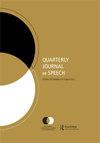Alienizing logics and rhetoric at the end of the world
IF 1.3
2区 文学
Q2 COMMUNICATION
引用次数: 0
Abstract
Click to increase image sizeClick to decrease image size Disclosure statementNo potential conflict of interest was reported by the author(s).Notes1 Annie Hill, “SlutWalk as Perifeminist Response to Rape Logic: The politics of Reclaiming a Name,” Communication and Critical/Cultural Studies 13, no. 1 (2016): 23–39.2 Karma R. Chávez and Annie Hill, “The Visual and Sonic Registers of Neighbourhood Estrangement,” Journal of Intercultural Studies 42, no. 1 (2021): 68–83.3 Karma R. Chávez, “Beyond Inclusion: Rethinking Rhetoric’s Historical Narrative,” Quarterly Journal of Speech 101, no. 1 (2015): 162–72.4 Michael Calvin McGee, “Text, Context, and the Fragmentation of Contemporary Culture,” Western Journal of Speech Communication 54, no. 3 (1990): 274–90.5 Edwin Black, Rhetorical Criticism: A Study in Method, 2nd ed. (Madison: University of Wisconsin Press, 1978), xi.6 Aimee Carrillo Rowe, Power Lines: On the Subject of Feminist Alliances (Durham, NC: Duke University Press, 2008).7 Lisa M. Corrigan and Mary E. Stuckey, “Rebooting Rhetoric and Public Address,” Rhetoric and Public Affairs 24, no. 1–2 (2021): 1–14.在世界末日,异化逻辑和修辞
点击放大图片点击缩小图片披露声明作者未发现潜在的利益冲突。注1:安妮·希尔:《荡妇游行:女性对强奸逻辑的回应:重新命名的政治》,《传播与批判/文化研究》第13期。卡玛·R. Chávez和安妮·希尔,“邻里隔阂的视觉和听觉记录”,《文化研究》第42期,2016。卡玛·R. Chávez,“超越包容:对修辞学历史叙事的再思考”,《语言学报》第101期。Michael Calvin McGee,“文本、语境与当代文化的碎片化”,《西方言语交际杂志》,2015年第54期。埃德温·布莱克:《修辞批评:方法研究》,第2版(麦迪逊:威斯康辛大学出版社,1978),第6页艾梅·卡里略·罗,《电力线:关于女权主义联盟的主题》(达勒姆,北卡罗来纳州:杜克大学出版社,2008)Lisa M. Corrigan和Mary E. Stuckey,“重新启动修辞学和公共演讲”,《修辞学与公共事务》24期,第2期。1-2(2021): 1-14。
本文章由计算机程序翻译,如有差异,请以英文原文为准。
求助全文
约1分钟内获得全文
求助全文
来源期刊

Quarterly Journal of Speech
COMMUNICATION-
CiteScore
1.80
自引率
36.40%
发文量
39
期刊介绍:
The Quarterly Journal of Speech (QJS) publishes articles and book reviews of interest to those who take a rhetorical perspective on the texts, discourses, and cultural practices by which public beliefs and identities are constituted, empowered, and enacted. Rhetorical scholarship now cuts across many different intellectual, disciplinary, and political vectors, and QJS seeks to honor and address the interanimating effects of such differences. No single project, whether modern or postmodern in its orientation, or local, national, or global in its scope, can suffice as the sole locus of rhetorical practice, knowledge and understanding.
 求助内容:
求助内容: 应助结果提醒方式:
应助结果提醒方式:


